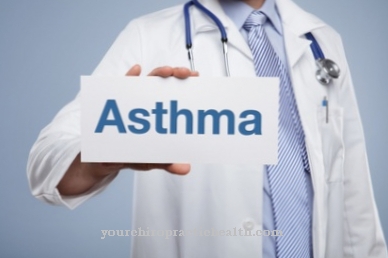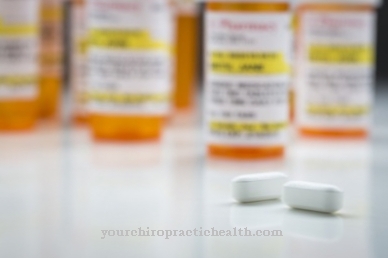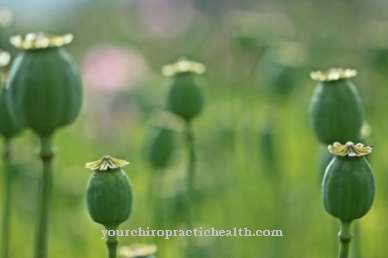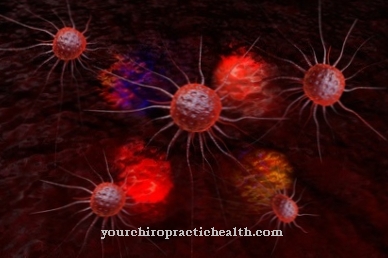Acetal cysteine is often a component of highly effective drugs for respiratory diseases to dissolve mucus and as an antidote for poisoning. Due to its diverse mechanisms of action, it is also used in other medical areas.
What is acetylcysteine?

Acetylcysteine is a biochemical agent with two different main areas of application. It is primarily used as a so-called expectorant (expectorant) in many drugs. Furthermore, acetylcysteine is very effective as an antidote (antidote) in paracetamol poisoning.
Other uses, such as B. kidney problems, infectious diseases and in psychiatry were examined and discussed. However, reliable results are not yet available. Due to the positive effects and the low risk of serious side effects, acetylcysteine is also used in diet foods.
Pharmacological effect
The effectiveness of Acetylcysteine In the treatment of such different complaints as the formation of mucus in respiratory diseases and intoxication with paracetamol is also based on different mechanisms of action.
The tough mucus in the bronchi consists of mucopolysaccharide chains that are connected to one another by sulfur bridges. Acetylcysteine now causes these sulfur bridges to be broken, whereby the mucus liquefies and can be coughed up easily. The antioxidant effect of acetylcysteine is discussed as a further mechanism. By catching free radicals, the inflammatory process in the bronchi can be stopped, which enables the bronchitis to heal. However, this thesis has not yet been confirmed. Rather, the mucus solution already has a positive influence on the healing process.
The other mechanism of action of acetylcysteine, which is mainly expressed in detoxification in the case of acetaminophen poisoning, is based on the antioxidant properties of NAC. Acetylcysteine (NAC) has both direct and indirect antioxidant effects. With the direct antioxidant effect of NAC, oxygen-containing radicals are scavenged by the SH group. Two acetylcysteine molecules connect to one another via disulfide bridges. The anti-inflammatory effects of this process have already been discussed.
However, the indirect mechanism is the more interesting and common antioxidant process. The glutathione produced when NAC is broken down acts as an antioxidant. Glutathione as a short peptide is normally stored in sufficient quantities in the liver and is the most important detoxifying agent in the organism. B. with paracetamol, however, the supply can be exhausted due to the high demand. Paracetamol becomes a deadly threat. The administration of acetylcysteine can neutralize the toxic effect of the poison.
Medical application & use
Because of its interesting spectrum of effects Acetylcysteine used in many medicines. NAC is used as an expectorant in various respiratory diseases to dissolve mucus. Good results are achieved with this.
Acetylcysteine is particularly indispensable for such serious diseases as cystic fibrosis. The mucus becomes liquefied and can be easily coughed up. However, the long-term treatment of bronchitis with acetylcysteine is more controversial. The mucus is loosened, but no significant reduction in the inflammatory process has been recorded so far.
However, the effectiveness of NAC as an antidote for the treatment of acetaminophen poisoning is completely undisputed. In acute poisoning, acetylcysteine is administered orally for approximately 20 hours or intravenously for 72 hours. Also for the detoxification of special chemical poisons, such as B. acrylonitrile, methacrylonitrile or methyl bromide, the effect of acetylcysteine has been proven.
The use of contrast media containing acetylcysteine in X-ray examinations of people at risk with kidney disease has shown no effectiveness. The effectiveness of acetylcysteine in psychiatric illnesses such as schizophrenia, obsessive-compulsive disorder or depression is currently being tested. Results are not yet available.
Another interesting area of application is research into the effectiveness of acetylcysteine for dissolving mucus in prostatitis.
Risks & side effects
When using Acetylcysteine very few side effects are known. However, its use is contraindicated in children under 2 years of age, with known hypersensitivity, with bronchial asthma and gastrointestinal bleeding.
When administered orally, nausea and vomiting can occur in rare cases. Heartburn, headache and fever have also been reported. Very rarely, anaphylactic shock can occur with intravenous administration.
Acetylcysteine should not be used together with antibiotics, but rather at intervals of 2 hours, because otherwise its effectiveness would be reduced.












.jpg)



.jpg)










.jpg)
